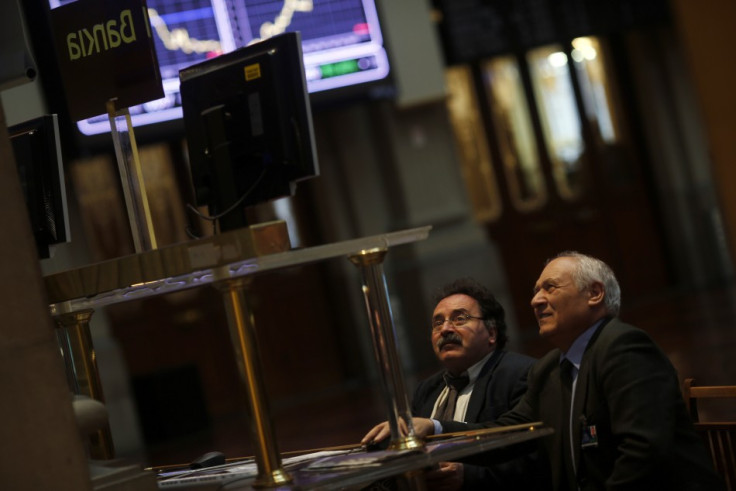European Markets Trade Lower Ahead of BoE, ECB Policy Decisions

European markets opened lower on 7 November, and continued trading to the downside thereafter, ahead of central bank monetary policy decisions from Britain and Europe and ahead of the release of US economic data.
The Stoxx Europe 600 index opened 0.1% lower to 322.92.
Britain's FTSE 100 and France's CAC 40 opened 0.2% lower.
Germany's DAX 30 opened 0.1% lower.
Spain's IBEX 35 was trading 0.43% lower after opening lower.
Italy's FTSE MIB was trading 0.60% lower after opening lower.
Market participants will be tracking the Bank of England (BoE) and European Central Bank's (ECB) policy meetings scheduled for 7 November, when both central banks will announce their interest rate decisions.
While the BoE is expected to leave its monetary policy unchanged, the ECB could lower its main refinancing rate, at 0.50% currently.
Preliminary data from the eurozone's statistics office showed last week that inflation unexpectedly dropped to 0.7% year-on-year in October, the lowest for nearly four years. The reading points to a stuttering economic recovery in the 17-nation bloc and could warrant an ECB rate cut, according to analysts.
The European Commission's latest forecast that Eurozone unemployment would remain near its record high for two years, amid sluggish economic growth; and the latest PMI data which showed that factory and services activity slowed in October, could together force the ECB to cut interest rates.
RBS said in a note to clients: "Given EUR/USD's historical relationship with swap spreads, measures of periphery stress and relative central bank balance sheets, it's unlikely that the EUR will weaken significantly on a refi rate cut and/or a dovish sounding press conference as only rate spreads really have potential to move against the EUR. A rate cut may actually see periphery yields slip, supporting the EUR".
"The EUR would be most vulnerable if the refi rate and deposit rate are cut or Draghi makes its clear that having cut the refi rate in November, further easing should be expected. As a general rule, the greater the degree of easing (rates, guidance and liquidity), the greater the scope for the EUR to weaken against high beta currencies (TRY, ZAR and AUD)", RBS added.
Market players will also be tracking US third quarter growth data, due on 7 November, and the October US nonfarm payrolls data, due on 8 November.
Together, the two sets of data will throw more light on the health of the world's largest economy and can influence the US Federal Reserve's 18 December monetary policy decision.
The Fed's $85bn (£53bn, €63bn) a month bond-buying stimulus programme has supported the US economy and stock markets the world over for a while now.
BofA Merrill Lynch Global Research said in a note to clients: "The severe US fiscal contraction is largely over. This is likely to lend a positive impetus to growth in early 2014.
"Spending will be boosted by higher healthcare outlays, and revenues are no longer driven by changes in the tax law," according to BofA.
"A pro-growth risk-on trade is possible in the New Year, but the impact on Treasury yields is likely to be moderate", BofA added.
In company news, French advertising firm JCDecaux will release its third quarter earnings update during the day.
French banks Credit Agricole and Societe Generale, utility firm EDF, German conglomerate Siemens, sports equipment maker Adidas, Deutsche Telekom, and steel giant ArcelorMittal have put out third quarter earnings.
In Asia and the US
In Asia, the Japanese Nikkei finished 0.76% lower on 7 November. The Shanghai Composite and South Korea's Kospi finished 0.48% lower, while Australia's S&P/ASX finished 0.22% lower.
Earlier, markets outside India traded lower as investors refrained from making large bets ahead of major events later in the week.
Market participants in Asia will be tracking a key meeting of senior Communist Party officials in Beijing on 9-12 November, where China's new leaders are expected to detail the nation's economic agenda for the next decade.
Historically, such meetings, known as third plenums, have served as a launch pad for economic change in the world's second largest economy.
Yonghao Pu, the regional chief investment officer, Asia-Pacific at UBS said in a note to clients: "The government has already initiated reforms in such areas as the financial system, taxation (replacing the business tax with value-added tax), government administration (streamlining certain approval rights), state-owned enterprises and monopolies (overhauling the railway system), and resource pricing (allowing market forces to set prices).
"In contrast, the government may need more time to build consensus and more carefully plan details of the more contentious reform areas such as fiscal management, taxation (including the property tax), land use, the household registration or 'hukou' system, and the one-child policy," Yonghao said.
"For markets, the question is no longer whether or not the government will carry out reform, but how fast and to what extent it will do so," Yonghao added.
Meanwhile, in Australia, data showed that the nation created a meager 1,100 jobs in October, way below expectations of 10,000 job additions. The news weighed on the benchmark index and the Australian dollar, which shed 0.4% against the US dollar.
On Wall Street, most indices ended higher on 6 November, with the Dow striking a record high at the end of day's trade, on hopes that the Fed could extend its asset buys longer than originally planned.
The Dow finished 128.66 points higher or 0.8% at 15,746.88.
The S&P 500 closed 7.52 points higher or 0.4% at 1,770.49, just 2 points below its record close.
However, the Nasdaqended 7.92 points lower or 0.2% at 3,931.95.
© Copyright IBTimes 2025. All rights reserved.




















